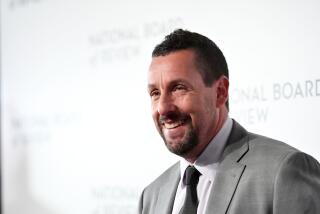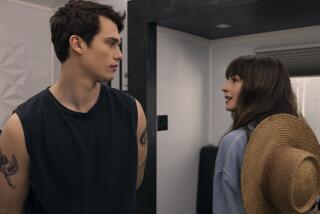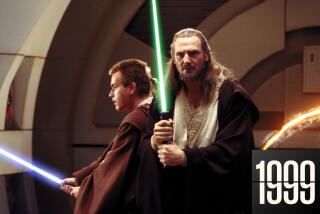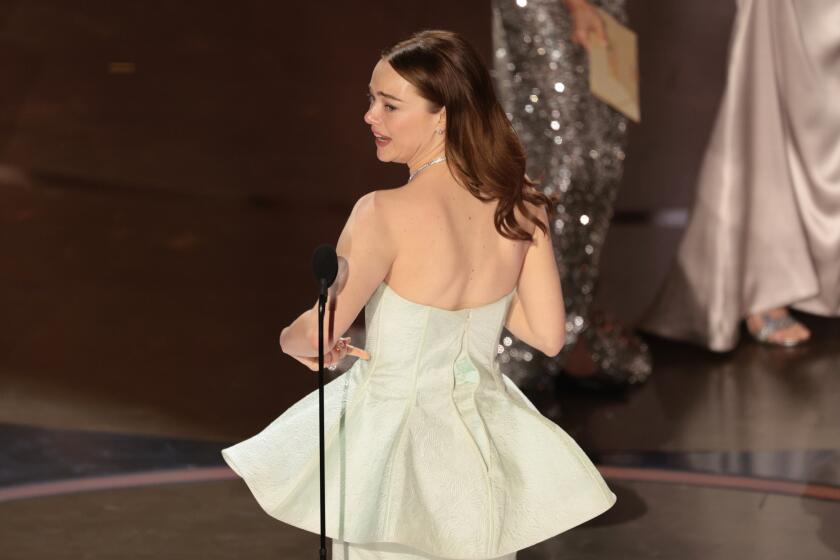British Writer Enjoying Different Spotlight : Movies: Christopher Hampton, who won an Oscar for best adapted screenplay for ‘Dangerous Liaisons,’ is now getting raves as a director.
Is it true, Christopher Hampton, that you gave 53 interviews in a single day about “Carrington,” your debut film as a writer-director?
“Actually it was 51,” says Hampton with appropriate bemusement. “I don’t want to exaggerate. When I did a press junket for ‘Dangerous Liaisons’ [for which he won an Oscar for best adapted screenplay], I had six interviews and Stephen Frears had 97, so one of the things I knew about moving from writing to directing is there would be a lot more interviews.”
One of Britain’s most accomplished playwrights, Hampton humorously allows that “since I’ve always earned my money from the theater, movies are my artistic indulgence. I write these scripts where the producer says, ‘I really enjoyed it, but I don’t think it’s for us. It’s very dark.’ ”
With Ken Loach’s “Land and Freedom,” an intimate epic about the Spanish Civil War that touches the heart despite its large scale, looking to be a Palme d’Or favorite (along with, if the advance word is to be believed, Emir Kusturica’s as-yet-unseen “Underground” from the former Yugoslavia), this has been a strong year for British film at Cannes. Even the Marche has presented treats like “Persuasion,” Roger Michell’s superb realization of what may be Jane Austen’s most deeply felt novel. “Carrington,” however, remains one of the most impressive of the lot.
An emotionally complex, moving look at the asexual but passionate love affair between British painter Dora Carrington (Emma Thompson) and author Lytton Strachey (a mesmerizing performance by Jonathan Pryce), the film amazes not only by how accomplished it is for a first-time director who never wanted the job in the first place, but also for the nearly 18 years it took to get made.
“Every two or three years you read a book that changes your view of life, and that is what happened with Michael Holroyd’s biography of Strachey,” Hampton explains. “The story of Carrington and Strachey was so unlike any story I’d ever come across. It questions a lot of the very basic assumptions we have about finding one person who will provide your sexual life, your emotional life, everything.”
Unlikely as it now seems, Warner Bros. commissioned a script about the couple and the Bloomsbury group, and Hampton remembers 1977, when he sat in a newly purchased hammock in his back yard, read through Strachey and Carrington’s correspondence and wrote the script, as “the most enjoyable year of my career.”
Hampton even got to go to Hollywood and work with Herb Ross as a possible director. “They’re very interesting, those very smart people who decide to do the kinds of films they do; they’re quite sort of wistful,” he remembers. “And Herb Ross was quite sort of wistful about this film.”
After Warner Bros. decided that this wasn’t quite for them, “Carrington” went for years refusing to conclusively live or die. “On and on it went, whenever it got set up, it fell through,” Hampton says. Finally it got cast and for several years Mike Newell was attached to direct, but, at the last minute, Newell withdrew.
“He said he’d just made this little British film, ‘Four Weddings and a Funeral,’ that wasn’t going to do anything, and he’d got to go off to America and do a proper movie.” Ironically, “Weddings” went on to be a major international success and Newell’s picture at TriStar eventually fell through. But at the moment, the “Carrington” bunch were so frantic they asked a reluctant Hampton if he wanted to take over himself.
“Philippe Carcasonne, one of the executive producers, called and said, ‘You know, in France it is not unknown for writers to direct,’ but I said, ‘Oh, no, no, I never wanted to do that.’ What clinched it was when Emma asked me. I was so flattered I said yes.”
Hampton’s reluctance to direct came in part from his experience standing on other sets, thinking, “ ‘This is so exhausting, so brutal, how can they do it?’ In fact, the director, crazed on adrenaline, is having a great time. It’s you as the writer, wondering what you’re doing there, who is projecting ennui in an inaccurate, sympathetic way.”
Shooting began in not the most promising manner, with a scene in Venice where Hampton wanted a gondolier to wink at Pryce’s Strachey. “He refused, he said, ‘It’s not in my character.’ I would go back to my hotel room and grumble, ‘I can’t even get the gondolier to follow my directions.’ ”
Eventually, however, “things settled down and I had the best time,” so much so that Hampton, in addition to his work on the screenplays for Stephen Frears’ “Mary Reilly” and Agnieszka Holland’s “Total Eclipse,” is in pre-production again to direct his own adaptation of Joseph Conrad’s “The Secret Agent.” “I really had a disgracefully good time,” he says, and, exhausted though he is from all those interviews, there is no doubt that he means it.
*
As readers of the best-selling “Possession,” her Booker Prize-winning novel, know, British author A.S. Byatt is fascinated by the Victorians. “They started, as it were, a series of thoughts we haven’t yet got the answer to,” she explains. “We still don’t really know what sort of animal we are, biological creatures or made by God. We’re still struggling with moral problems that began with them, and I believe if you understand the origins of something, you know what it is.
“Also, I grew up on the Victorians, I read them as a tiny child. It was during the war, I lay in bed reading Bronte and Eliot, and I didn’t understand that they weren’t happening now. It was my world.”
Byatt’s novella, “Morpho Eugenia,” also set in Victorian England, has been turned into “Angels & Insects,” in competition here, and that has brought the author to Cannes for the first time. “I quite enjoy it,” she says in her engagingly forthright way. “I’m a workaholic, and everyone here is too. It’s a city full of them, frantically busy. Like the ant heap.”
Originally conceived, Byatt says, as an idea for a TV movie, the “Angels” draws intriguing parallels between the ant world and the busy goings-on in a large Victorian house where a pioneering naturalist (Mark Rylance) finds a patron and engages the interest of two of the women who live there, played by Patsy Kensit and Kristin Scott Thomas.
Never having had a book turned into a film before, Byatt was cautioned to expect the worst. “Lots of people warned me that it would be turned into an American period cliche and end up shorter and less complicated,” she says. Instead, she found herself agreeing with her American paperback publisher who wrote her that a screening left him “revolving with pleasure.”
Part of the reason Byatt is so taken with “Angels” is that she was extensively consulted. Director Philip Haas (who co-wrote the screenplay with his wife, Belinda) “rather cunningly hooked me in like a fish, bit by bit.” The author even came to a reading (“as a novelist you want to see new things, and watching actors audition was not in my repertory”) and professes herself well satisfied with the casting, particularly Scott Thomas as Matty, the film’s redoubtable poor relation.
“She is dead spot on, exactly what I wanted to see in that part, and when she takes her hair down, she looks like George Eliot in a way,” says Byatt, who considers Eliot a major influence. And she is delighted that “Angels” ended up being filmed in Arbury Hall in Warwickshire, the house where the novelist grew up. “There are scenes that she wrote that took place exactly in that house,” Byatt says, and her eyes gleam with pleasure.
More to Read
Only good movies
Get the Indie Focus newsletter, Mark Olsen's weekly guide to the world of cinema.
You may occasionally receive promotional content from the Los Angeles Times.







